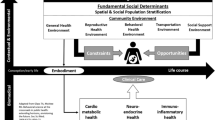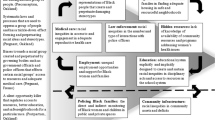Abstract
Objective
The lived-experience of race and racism among historically vulnerable populations needs critical examination in the United States’ (US) maternal and reproductive healthcare system. This study aims to measure how street-race influences the experiences of pregnancy and birthing among Black and Afro-Latina women in the South Florida region. Street-race, in this study, focuses on the lived experiences of phenotype and colorism (as real consequences due to structural racism) imposed on women during clinical encounters.
Methods
Twenty-five women who self-reported their racial and street-identity as Black and / or Afro-Latina were interviewed, utilizing the qualitative approaches of narrative medicine and phenomenology. Study participants also had to have at least one recent pregnancy or birth of a living child (< 24 months).
Results
Adverse maternal mortality outcomes also do not tell the full story of what it means to be Black while giving birth in North America. The dominance of White-presenting Latinx individuals in South Florida (a seemingly “diverse” urban region) is also historical and persistent. These oppositional consequences at the clinical encounter, regarding street-race, further illustrate how White-dominance (via phenotype and skin color) are ever-present across US healthcare institutions serving pregnant women.
Relevance
The lived experience of hegemonic racial hierarchies (e.g., Black and White), ongoingly contributes to the racialization of maternal and reproductive healthcare in the US, as more attention is needed to achieve health equity.
Similar content being viewed by others
Notes
Black and Afro-Latina woman also self-identify as Black Latina, Afro-Caribbean, and or African-American. Any typology of blackness can be included, as long as the study participant self-identifies as Black and has recently given birth in the South Florida region of the US.
Perceived-race became a “probe question” and a demographic question (that was asked after the first four interviews), particularly after observing that respondents mentioned the difference between self-identity verses perceived-identity (which can yield two different experiences).
References
Adams, C., & Thomas, S. P. (2018). Alternative prenatal care interventions to alleviate black/white maternal and infant health disparities. Sociology Compass. https://doi.org/10.1111/soc4.12549
Aja, A.A., Zaw, K., Beesing, G., Price, A.E., Bustillo, D., Darity Jr, W., Clealand, D., Paul, M. and Hamilton, D. 2019. The color of wealth in Miami Report, 2019. The Ohio State University, Duke University and the Insight Center for the Community Economic Development. Retrieved January 15, 2020, from http://kirwaninstitute.osu.edu/wp-content/uploads/2019/02/The-Color-of-Wealth-in-Miami-Metro.pdf
Banks, K. H., Kohn-Wood, L. P., & Spencer, M. (2006). An examination of the African American experience of everyday discrimination and symptoms of psychological distress. Community Mental Health Journal, 42(6), 555–569.
Bell, J. F., Zimmerman, F. J., Almgren, G. R., Mayer, J. D., & Huebner, C. E. (2006). Birth outcomes among urban African-American women: A multilevel analysis of the role of racial residential segregation. Social Science and Medicine, 63(12), 3030–3045. https://doi.org/10.1016/j.socscimed.2006.08.011
Bonilla-Silva, E. (2006). Racism without racists: Colorblind racism and the persistence of racial inequality in America. Rowman and Littlefield Publishers.
Bridges, K. (2011). Reproducing race: An ethnography of pregnancy as a site of racialization. University of California Press.
Center for Disease Control (2021). Retrieved from https://www.cdc.gov/reproductivehealth/index.html?CDC_AA_refVal=https%3A%2F%2Fwww.cdc.gov%2Fchronicdisease%2Fresources%2Fpublications%2Faag%2Fmaternal.html
Charon, R. (2006). Narrative medicine: Honoring the stories of illness. Oxford University Press.
Collins, J. W., David, R. J., Handler, A., Wall, S., & Andes, S. (2004). Very low birthweight in African American infants: The role of maternal exposure to interpersonal racial discrimination. American Journal of Public Health, 94(12), 2132–2138.
Collins, P. H. (1990). Black feminist thought: Knowledge, consciousness, and the politics of empowerment. Routledge.
Collins, P. H. (2004). Black sexual politics. Routledge.
Crenshaw, K. (1991). Mapping the margins: Intersectionality, identity politics, and violence against women of color. Stanford Law Review, 43(6), 1241–1299.
Declercq, E. R., Sakala, C., Corry, M. P., & Applebaum, S. (2007). Listening to mothers II: Report of the second national U.S. survey of women’s childbearing experiences. Journal of Perinatal Education, 16(4), 9–14.
Delgado, R., & Stefanic, J. (2000). Critical race theory. New York University Press.
Dubois, W. E. B. (1905). Souls of Black Folk. Dover Publications Inc.
Dubois, W. E. B. (1920). DARKWATER: Voices from within the veil. Harcourt, Brace.
Farmer, P. E., Nizeye, B., Stulac, S., & Keshavjee, S. (2006). Structural violence and clinical medicine. PLoS Medicine, 3(10), e449. https://doi.org/10.1371/journal.pmed.0030449
Giscombe, C., & Lobel, M. (2005). Explaining disproportionately high rates of adverse birth outcomes among African Americans: The impact of stress, racism, and related factors in pregnancy. Psychological Bulletin, 131(5), 662–683.
Guerra-Reyes, L., & Hamilton, L. J. (2016). Racial disparities in birth care: Exploring the perceived role of African-American women providing midwifery care and birth support in the United States. Women Birth, 30(1), e9–e16. https://doi.org/10.1016/j.wombi.2016.06.004
Hochschild, J. L., & Weaver, V. (2007). The skin color paradox and the American racial order. Social Forces, 86(2), 634–670.
Hunter, M. L. (2005). Race, gender, and the politics of skin tone. Routledge.
Hunter, M. L. (2007). The persistent problem of colorism: Skin tone, status, and inequality. Sociology Compass, 1(1), 237–254.
Lee, E. S. (Ed.). (2014). Living alterities: Phenomenology, embodiment, and race. SUNY Press.
Lee, E. S. (Ed.). (2019). Race and phenomena: Between phenomenology and philosophy of race. Rowman and Littlefield.
Lopéz, N., Vargas, E. D., Juarez, M., Cacari-Stone, L., & Bettez, S. (2018). What’s your street-race? Leveraging multidimensional measures of race and intersectionality for examining physical and mental health among Latinxs. Sociology of Race and Ethnicity, 4(1), 49–66.
McLemore M. 2019. To prevent women from dying in childbirth, first stop blaming them. Scientific American. Retrieved from https://www.scientificamerican.com/article/to-prevent-women-from-dying-in-childbirth-first-stop-blaming-them/
Merleau-Ponty, M. (1973). Adventures of the dialectic. Northwestern Press University.
Mishler, E. G. (1984). The discourse of medical interviews. Ablex Publishing Corporation.
Mullings, L., McLean, D., Mitchell, J., Prince, S., Thomas, D., & Tovar, P. (2001). Qualitative methodologies and community participation in examining reproductive experiences: The harlem birth project. Maternal and Child Health Journal, 5, 85–93.
Murphy, J. W., Franz, B. A., Choi, J. M., & Callaghan, K. A. (2018). Narrative medicine and community-based health care planning. Springer.
Newby, C. A., & Dowling, J. A. (2007). Black and hispanic: The racial identification of Afro-Cuban immigrants in the South west. Sociological Perspectives, 50(3), 343–366.
Roberts, D. (1997). Killing the black body. Routledge Press.
Simonds, W., Rothman, B. K., & Norman, B. M. (2007). Laboring on: Birth in transition in the United States. Routledge Taylor and Francis Group.
Singleton, R., & Straits, B. C. (2010). Approaches to social science research (5th ed.). Oxford University Press.
Slaughter-Acey J. 2019. Maternal and infant health at the crossroads of racism and colorism. Retrieved from https://www.racialhealthequity.org/blog/2019/4/16/maternal-and-infant-health-at-the-cross-roads-of-racism-and-colorism
Valdes F. 1997. LatCrit theory and community: From invisibility, toward indivisibility. Harvard Latino L. Rev., 2(1).
Zambrana, R., & Dill, B. T. (2006). Disparities in Latina health: An intersectional analysis. In A. J. Schulz & M. Leith (Eds.), Race, class, gender and health: Intersectional approaches (pp. 192–227). Jossey-Bass.
Funding
Funding for this study was received through a research grant award obtained from the University of Miami’s Department of Sociology and the McKnight Florida Education Fund.
Author information
Authors and Affiliations
Corresponding author
Additional information
Publisher's Note
Springer Nature remains neutral with regard to jurisdictional claims in published maps and institutional affiliations.
Rights and permissions
About this article
Cite this article
Thomas, S.P. Street-Race in Reproductive Health: A Qualitative Study of the Pregnancy and Birthing Experiences among Black and Afro-Latina Women in South Florida. Matern Child Health J 26, 700–707 (2022). https://doi.org/10.1007/s10995-021-03188-2
Accepted:
Published:
Issue Date:
DOI: https://doi.org/10.1007/s10995-021-03188-2




